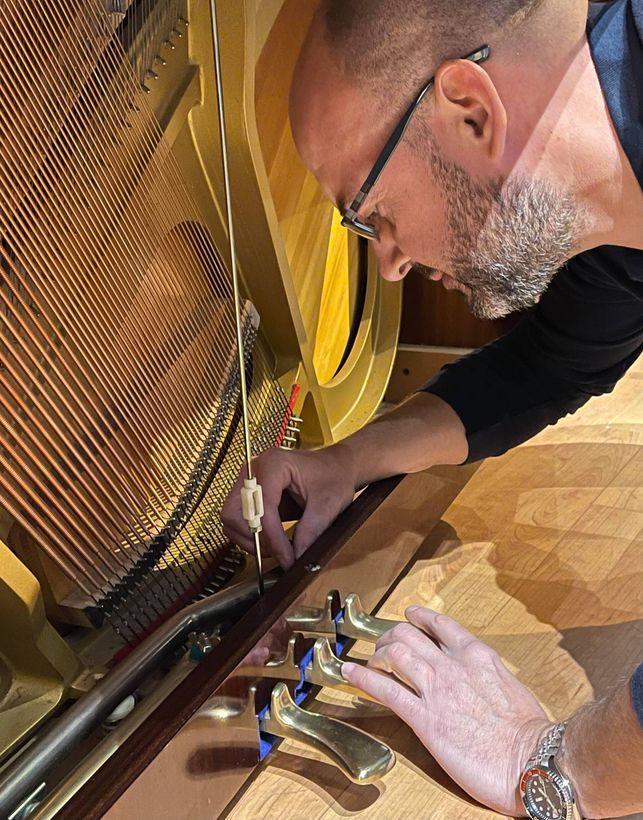Book your Service
Lead Gen Contact Form
Steve is a professional piano tuner based in Horsham, West Sussex. Ever since childhood, Steve has had a passion for music, playing both the piano and organ from the age of 12.
A love of both instruments saw him pursue a successful career within the music industry, initially as a teacher and then latterly as proprietor of a vibrant music school and retail business in Croydon, South London.
Steve undertook training as a luthier in 2007, enabling him to offer a range of repair services for guitars and stringed instruments. Always regarding the piano as his first love though, Steve fulfilled a long held desire to train as a qualified piano tuner, and graduated from The Piano Technology School in Northampton. His piano tuning and repair services cover the whole of Surrey and Sussex, with his workshop being based in Horsham.
Steve lives in Horsham, West Sussex, with his wife and family along with their menagerie of pets. He loves walking, running, cooking, 'making things' and spending time with his friends and family.
A fully enhanced DBS check enables Steve to work within environments such as schools and colleges requiring this level of certification.
Testimonials
“Diligent and very professional. My piano hadn’t been tuned for several years but now it sounds amazing. Also, Steve fixed a chip in the gloss and it is as good as new! Highly recommend!”
Rebecca Thornton 7/3/21
“Steve provided a friendly and professional service. He's clearly knowledgeable about pianos, and was more than happy to talk through what he was doing and why. I would certainly recommend to others.”
Lewis White 5/3/21
“Steve is obviously passionate about his work and took great care to explain what he was doing as well as the future work that may become necessary on the instrument. His precise work brought back the lovely warm tone to our piano.”
Adey Grummet 25/3/21
“Having seen him at work, I'd have to say Steve is probably the most conscientious professional I've seen. Prompt, considerate, extremely thorough & fairly priced. Easy recommendation.”
David McLeod 1/2/21
Services
Fine Tuning
Fine tuning is required every 6-12 months, depending on usage and other factors such as environment. An assessment will enable me to determine the regularity of tuning required -Typically 6-monthly tuning schedules (preferable to maintain tension and stability in the piano and to preserve the existing tuning) or 12-monthly depending on what the clients needs are.
Pitch Raising
Pitch raising is carried out initially when the instrument has not been tuned for many years and the pitch has dropped. This requires two tuning ‘passes’, one rough tune to bring it up to the desired pitch and a second fine tuning pass to complete the process. Sometimes, depending on the stability of the instrument, a second follow up visit within a few weeks may be required to continue to stabilise the tuning.
Regulation
Regulation involves making adjustments to the instrument. Examples include voicing, keyboard servicing, key levelling, adjustment of key dip, blow distance, let off, checking distances and damper regulation.
Other Services
Hammers
Hammer spacing, hammer/damper travelling, hammer casting and string mating, hammer refacing.
Minor Repairs
For example Stringing, which involves replacing broken or damaged strings.
Casework Detailing
Scratches improved/removed, casework polished including brass work and replacing the nameboard and pedal felts.
Light Refurbishment
Minor refurbishment including replacing key bushings, broken hammers, replacing bridle tapes, re-centring of flanges, hammer butt and damper springs.
What Causes My Piano To Go Out Of Tune?
Whether it is for personal use or for delighting a huge crowd in a concert hall, keeping your piano in tune is necessary for maintaining the value, condition, and function of the piano. Tuning involves adjusting and improving the strings' tension to make sure that each of them vibrates harmoniously with one another at a certain frequency. We’ve rounded up the various reasons why your piano plays out of tune.
Moving The Instrument Frequently
Committing to a single location would hands down work best for your piano as moving it around even for small distances may cause it to lose its tuning. The less frequently you move it, the more time you have between piano tuner appointments.
Cleaning The Inside Of Your Piano
While it is essential to clean your piano to remove grime, dust, and fingerprints, keep in mind that too much contact with its strings may affect the piano's tuning. It is best to time a thorough clean of your instrument right before the next tuning appointment as it promotes efficiency and cost-efficiency.
Regulate Room Moisture
Installing a tool such as a dehumidifier at the bottom of your piano can help maintain the temperature and moisture of the room where the piano sits. Not only does this keep the humidity of the room in check, but it also enables you to take further steps in maintaining your instrument's health.
Allowing Your Piano To Rest Too Close To The Wall
As walls tend to get warm particularly during the hottest times of the day, heat can directly be transferred to the instrument which can cause the wood to swell and the strings to loosen. Placing your piano strategically away from the walls allows you to capture everyone's attention during a performance as well as keep your instrument safe and properly ventilated.
